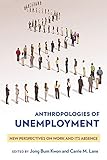Anthropologies of Unemployment : New Perspectives on Work and Its Absence / ed. by Carrie M. Lane, Jong Bum Kwon.
Material type: TextPublisher: Ithaca, NY : Cornell University Press, [2016]Copyright date: ©2016Description: 1 online resource (288 p.) : 3 halftones, 1 table, 1 chartContent type:
TextPublisher: Ithaca, NY : Cornell University Press, [2016]Copyright date: ©2016Description: 1 online resource (288 p.) : 3 halftones, 1 table, 1 chartContent type: - 9781501706134
- Economic anthropology
- Unemployed -- Social conditions
- Unemployed; Social conditions
- Unemployment -- Social aspects
- Unemployment; Social aspects
- Anthropology
- Labor History
- SOCIAL SCIENCE / Anthropology / Cultural & Social
- Unemployment, anthropology of unemployment, global unemployment, rural and urban unemployment, free-market ideologies and policies, economic insecurity
- 331.13/7
- HD5708
- online - DeGruyter
| Item type | Current library | Call number | URL | Status | Notes | Barcode | |
|---|---|---|---|---|---|---|---|
 eBook
eBook
|
Biblioteca "Angelicum" Pont. Univ. S.Tommaso d'Aquino Nuvola online | online - DeGruyter (Browse shelf(Opens below)) | Online access | Not for loan (Accesso limitato) | Accesso per gli utenti autorizzati / Access for authorized users | (dgr)9781501706134 |
Frontmatter -- Contents -- Acknowledgments -- Introduction -- 1. The Limits of Liminality -- 2. The Limits to Quantitative Thinking -- 3. Occupation -- 4. The Rise of the Precariat? -- 5. Contesting Unemployment -- 6. Zones of In/Visibility -- 7. Youth Unemployment, Progress, and Shame in Urban Ethiopia -- 8. Labor on the Move -- 9. Positive Thinking about Being Out of Work in Southern California after the Great Recession -- 10. The Unemployed Cooperative -- Epilogue: Rethinking the Value of Work and Unemployment -- Notes -- Bibliography -- Notes on Contributors -- Index
restricted access online access with authorization star
http://purl.org/coar/access_right/c_16ec
Anthropologies of Unemployment offers accessible, theoretically innovative, and ethnographically rich examinations of unemployment in rural and urban regions across North and South America, Europe, Africa, and Asia. The diversity of case studies demonstrates that unemployment is a pressing global phenomenon that sheds light on the uneven consequences of free-market ideologies and policies. Economic, social, and cultural marginalization is common in the lives of the unemployed, but their experience and interpretation are shaped by local and national cultural particularities. In exploring those differences, the contributors to this volume employ recent theoretical innovations and engage with some of the more salient topics in contemporary anthropology, such as globalization, migration, youth cultures, bureaucracy, class, gender, and race.Taken together, the chapters reveal that there is something new about unemployment today. It is not a temporary occurrence, but a chronic condition. In adjusting to persistent, longstanding unemployment, people and groups create new understandings of unemployment as well as of work and employment; they improvise new forms of sociality, morality, and personhood. Ethnographic studies such as those found in Anthropologies of Unemployment are crucial if we are to understand the broader forms, meanings, and significance of pervasive economic insecurity and discover the emergence of new social and cultural possibilities.Contributors Josh Fisher, High Point UniversityDavid Karjanen, University of MinnesotaAnn E. Kingsolver, University of KentuckyJong Bum Kwon, Webster UniversityCarrie M. Lane, California State University, FullertonCaitrin Lynch, Olin College Daniel Mains, University of OklahomaJohn P. Murphy, Gettysburg CollegeMariano D. Perelman, University of Buenos AiresFrances Abrahamer Rothstein, Montclair State UniversityClaudia Strauss, Pitzer College
Mode of access: Internet via World Wide Web.
In English.
Description based on online resource; title from PDF title page (publisher's Web site, viewed 26. Apr 2024)


